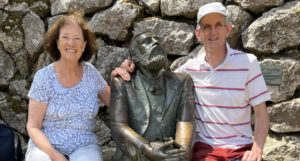University of Exeter panellists, including co-chairs,confirmed for REF People, Culture and Environment Pilot

The University of Exeter has placed =155th globally in the QS World University Rankings 2026
Three leading experts from the University of Exeter have been selected for membership of the REF People, Culture and Environment (PCE) pilot panels, it has been announced.
Drs Astrid Wissenberg, Professor Neil Gow and Professor Claire Dunlop have been selected to take part in the pilot exercise, which aims to enhance and improve the practicality and assessment methods used for submitting for REF2029.
The pilot is designed to develop clear, practical criteria that will help institutions submitting entries for REF 2029 to showcase how they support inclusive and dynamic research environments and research culture to produce quality, impactful research.
In the pilot, a broad sample of 40 Higher Education Institutions will produce submissions for assessment in a selection of REF Units of Assessment (UoAs). These submissions will be assessed by eight UoA-level pilot panels, with institutional-level submissions examined by a separate panel.
This institutional-level panel will be comprised of the UoA co-chairs, and chaired by Professor Chris Day, CBE.
From Exeter, Drs Astrid Wissenberg will co-chair the PCE Pilot panel for UoA 20, which relates to Social Work and Social Policy. Professor Claire Dunlop will also act as a panel member in this category.
Drs Wissenberg said: “I am very privileged to co-chair one of the PCE pilot panels, building on my experience in RAE and REF assessments since 2005. I look forward to helping to find approaches to assess excellence in research culture, having championed this area for well over a decade.
Professor Dunlop added: ‘I am delighted to be appointed as a member of REF’s People, Culture and Environment (PCE) pilot panel Unit of Assessment 20 (Social Work and Social Policy). The PCE pilot initiative underscores the vital importance of fostering an inclusive research culture for the benefit of all academics and universities. Building such a culture is not only essential for innovation and equity but also for ensuring the excellence of our academic communities. I look forward to collaborating with colleagues to shape the development of PCE indicators and contribute meaningfully to the REF2029 submission and assessment processes’.
Meanwhile, Professor Neil Gow will Co-chair of the PCE Pilot panel for UoA5, looking at Biological Sciences.
Professor Gow said: “I am very pleased to be invited to co-chair the REF’s People, Culture and Environment (PCE) pilot panel for Unit of Assessment 5( Biological Sciences). Our performance in the last REF exercise saw Exeter achieve the largest percentage jump in our QR income for any Russell Group university.
“But REF also supports and reinforces best practices in research culture and environment that will support the careers and every day experiences of our excellent research staff. This pilot will help in bringing examples of best practice together, and it will enable REF2029 to ask the right questions across the HEI sector in the next REF exercise. Exeter already has a lot to offer in this space and I’m delighted to be helping to take the PCE agenda forward.”
Professor Krasimira Tsaneva-Atanasova, Vice-President and Deputy Vice-Chancellor (Research and Impact) at the University of Exeter said: “I am delighted to share that three of our outstanding colleagues—Astrid, Neil, and Claire—have been selected as co-chairs and members of the REF2029 PCE Pilot.
“This achievement is a testament to their dedication and leadership in fostering an inclusive and supportive research environment here at the University of Exeter. At Exeter, we are committed to enabling everyone in our community to thrive, feel fulfilled, and realise their full potential. Our research excellence is underpinned and enhanced by an open, ethical and supportive research culture and environment, and these appointments reflect how we are living those values.
“I am excited to see how Astrid, Neil, and Claire contribute to shaping the PCE pilot and to learning from its progress. This is a valuable opportunity to showcase our vibrant research culture and the incredible work being done across the institution as we prepare for our REF2029 submission and support this sector-wide endeavour.”



